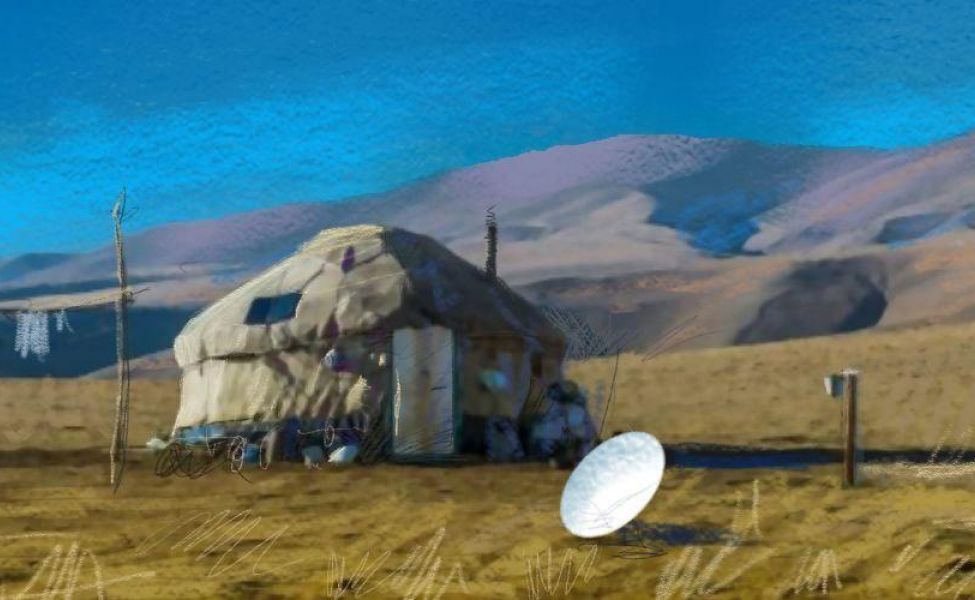
Control over the internet remains an issue
For every country in the world, the appearance of the internet has presented vast possibilities but also formidable challenges.
This was especially true in Central Asia where the governments are obsessed with controlling information that can be accessed by the public.
Kazakhstan is unique among the Central Asian states in that the Kazakh government has expended significant energy and resources to make Kazakhstan a modern country with a tech savvy population.
Control over the internet remains an issue and has sparked a debate in Kazakhstan about the use of foreign telecommunications satellites.
Countrywide Connections
In late 2024, Kazakhstan’s Ministry of Digital Development stirred controversy by proposing new regulations on imports of telecommunications equipment. One proposal would ban the use of equipment from foreign companies that do not have control centers inside Kazakhstan.
In December 2024, the Digital Development Ministry specifically named Inmarsat, Thuraya, Iridium, and Starlink as targets for a usage ban. Kazakhstan actually has a national security law that “prohibits the establishment and operation of communication networks within Kazakhstan if their control centers are based outside the country.”
However, Kazakhstan is a large country with most of its population living in roughly the eastern third of its territory. Cities, towns, and villages scattered across the western two-thirds of Kazakhstan are poorly connected to the internet and Kazakh authorities started discussions with Musk’s SpaceX about use of Starlink, a subsidiary of SpaceX with a network of satellites.
In October 2023, Kazakh authorities “introduced broadband internet in ten rural schools using Starlink technology in a test mode.” The pilot project envisioned sending Starlink terminals to 2,000 schools. By April 2024, the system was already connecting 447 rural schools to the internet, and by August the number had climbed to 1,731 schools.
Kill Switch Required
In November 2023, the director of the Ministry of Digital Development’s Telecommunications Committee, Dias TOLEGENOV, warned citizens that private use of Starliink terminals was illegal in Kazakhstan. The “current version” of Starlink “violates current (Kazakh) legislation, as it does not meet safety requirements,” Tolegenov said.
This ban is still In effect.
In May 2024, the director of Kazakhstan’s Kokterek Space Communications Center, Roman ERMASHOV, reiterated that according to Kazakhstan’s laws, “projects using foreign satellite communication systems in non-geostationary satellite orbits,” such as Starlink, must have “a gateway (interface) station on the territory of Kazakhstan.”
SpaceX refused to install the station in Kazakhstan.
“This is about safety,” Ermashov said, “Because if any information security incident occurs, such as a data leak, everyone turns to the state.”
This comment by Ermashov cuts to the heart of the matter.
During the mass unrest in Kazakhstan in January 2022, authorities cut off the internet around the country to prevent protesters from coordinating their actions or releasing information about what was happening to the world outside Kazakhstan.
Later that same year, Tajikistan ‘s government cut off the internet connection to the eastern Gorno-Badakhshan Autonomous Oblast during unrest, and Uzbek authorities did the same to the western Karakalpakstan Republic when violence broke out there in early July.
Certainly, Kazakh officials would like to have the ability to provide information to citizens across the country, including rural areas, especially in a time of emergency, such as the severe flooding that hit much of Kazakhstan in 2024.
Kazakh officials, however, do not want citizens to be able to disseminate anti-government information or organize or coordinate protests using technology that the government cannot shut down at a moment’s notice.
Other Options
The laudabe project to connect rural schools to the internet using Starlink is continuing, though that project will finish in 2026 and it is unclear what will happen after that.
The Digital Development Ministry withdrew the proposal after it sparked strong resistance, but it seems likely to be reintroduced. The Ministries of Digital Development, Finance, trade, and National Economy are currently reviewing the proposal and making revisions. The Digital Development Ministry noted the Eutelsat-OneWeb operator “meets national security requirements and provides communication services via non-geostationary satellites.”
Kazakh authorities are also in talks with Amazon Kuiper and Shanghai Spacecom Staellite Technology Co., both of which seem amendable to the idea of establishing gateway stations in Kazakhstan, though neither can provide all the services of Inmarsat, Thuraya, Iridium, or Starlink.
Kazakhstan’s National Security Committee (KNB) says devices with control centers outside Kazakhstan pose a potential threat to data security of citizens and state bodies. The KNB has reason to worry since in February 2024 it helped uncover a group of Chinese hackers who had access to Kazakhstan’s telecommunication operators, pension fund, Defense Ministry and more for two years.
The main point for Kazakhstan is that the government wants its people to be as knowledgeable as possible about computer technology and internet use so that the country can grow and compete globally. But the Kazakh government does not want citizens to use the internet to foment popular unrest or even spread information and narratives that run counter to the state’s policies.
By the The Times Of Central Asia.
Image: TCA, Aleksandr Potolitsyn.
YOU CAN SHARE YOUR OPINION AND DISCUSS THE ARTICLE ON OUR TELEGRAM CHANNEL!

















